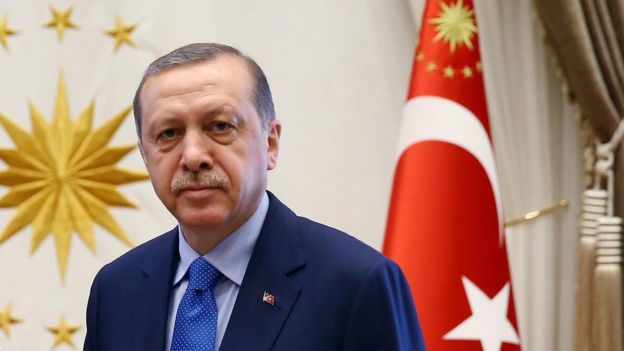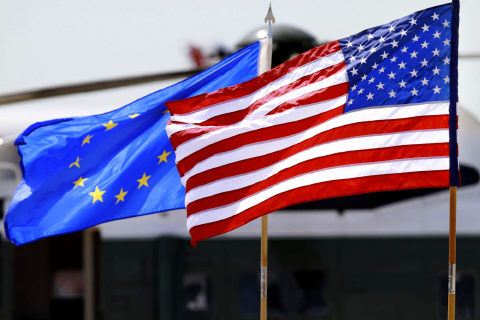Hannah Weichbrodt
J.D. Candidate, Columbia Law School, 2017
The two largest crises presently facing Germany are the influx of migrants—a 19% increase between 2013 and 2014, most notably from Syria—and a belligerent Russian next-door neighbor. In assessing how Germany should respond to these emergency situations, Thomas Bagger, the Head of Policy Planning for the German Foreign Ministry, notes the historic context in which Germany understands its role within Europe and its evolving self-conception as a world power. After the Fall of the Berlin Wall, Germany was surrounded by friends and recognized itself as occupying a space in a “sea of tranquility,” a marked change from previous history. They assumed roles of non-interference in the international realm and sought European integration.
However, with the resurgence of Russian antagonism in the East, and civil wars and military tensions raging around the world, Germany has found that its sea is more broiling than peaceful. The goal of European integration has changed its face since the addition of new Baltic member states and the vast increase of migrants around the globe. Germany is centered in the middle of both conflicts, accepting some of the largest amounts of immigrants of any country in the world, and its proximity to Russia. The Syrian refugee crisis has brought both of these issues to a head, as Germany must work with Russia to address the instability in Syria, and work with the EU to accept the ever-increasing number of refugees arriving in Germany and other EU member states.
In the summer of 2015, Germany witnessed an increase in immigrants from Syria, Iraq, Afghanistan, and Pakistan through the Balkan states. Germany opened its border and took in the refugees from these countries, but felt a lack of support from other EU member states. The EU Commission decided to address this crisis in its recent meeting in September 2015. The question on the table was how best to “help migrants in need of international protection, and return migrants who have no right to stay in EU territory.” Germany felt that the EU ought to change its stance on refugee assistance and immigration, both in its disputed Dublin rules as well as its implementation, which has been poor. Germany itself had been moved by compassion and empathy to the plight of the refugees, but there should be a comprehensive EU response to this crisis. The practical challenges faced by the EU in implementing a response to the refugee crisis and European integration involves the necessity of a measured message of accepting, but not encouraging, migrants into the EU, ensuring standardized procedures and a joint response among the member states, and uniting to address the root causes of migration.
Germany is at the center of all of these issues, and is facing a historic moment as the central actor within the EU that will influence their response to world issues. They have already taken the lead by accepting an increasing number of refugees fleeing from conflicts, helping to resolve the Eurozone debt crisis, and evidenced their willingness to take offensive steps in the foreign policy realm by denouncing Russian aggression. Germany is no longer quietly floating in its sea of tranquility, and has now assumed a leadership role within the EU. As the economic power in the region, they have the capacity to accept migrants into the country, as well as the clout to encourage movement against Russian aggression.
The response of other EU countries has been less welcoming. Hungary has isolated itself by building a fence between its borders with Croatia and Serbia in order to stem the flow of the increasing number of migrants traveling through their country. Poland and Slovakia have capped their acceptance of refugees on their non-Muslim status, accepting only Syrian Christians. In response to these actions, Germany has called on member states to institute quotas and accept the increasing number of migrants, hoping to encourage other states to adopt the open immigration examples set by Sweden and Germany itself.
The largest difficulty within Germany is maintaining consistent messaging to refugees and immigrants of wanting to accept, but not encourage, refugees and immigrants. Germany has had to face its past of xenophobic actions and present protestations, and has implemented a contrary, welcoming response. However, Germany must assess its integration process and infrastructure in order to begin allowing more immigrants into the country, a challenge facing many other EU member states. Their economic power makes Germany an increasingly attractive option for refugees, although the amount of immigrants could threaten their economic capability. Germany has the greatest capacity within the EU to accept refugees, but must protect what has helped the economy grow. In addition, Germany wants to focus on accepting those most deserving of its protection, a potentially loaded phrase, but one evincing the German belief that it is their moral and legal duty to help protect the most vulnerable migrants.
Germany has also evolved in its self-understanding as a foreign diplomatic leader. Post-WWII, Germany focused on internal improvement and European integration, choosing to distance itself from world politics and avoid entering into the political arena. Until now, this has been a fine response. However, its current economic position has given Germany an increasing amount of influence in the foreign policy realm. This has allowed Germany to take a stand against Russian aggression and to become a leader on the migrant issue within the EU. Continue to watch as Germany discovers what to do with this newly-found international clout.
Featured image source: http://www.mercatornet.com/demography/view/germany-population-growth-by-immigration/16944




